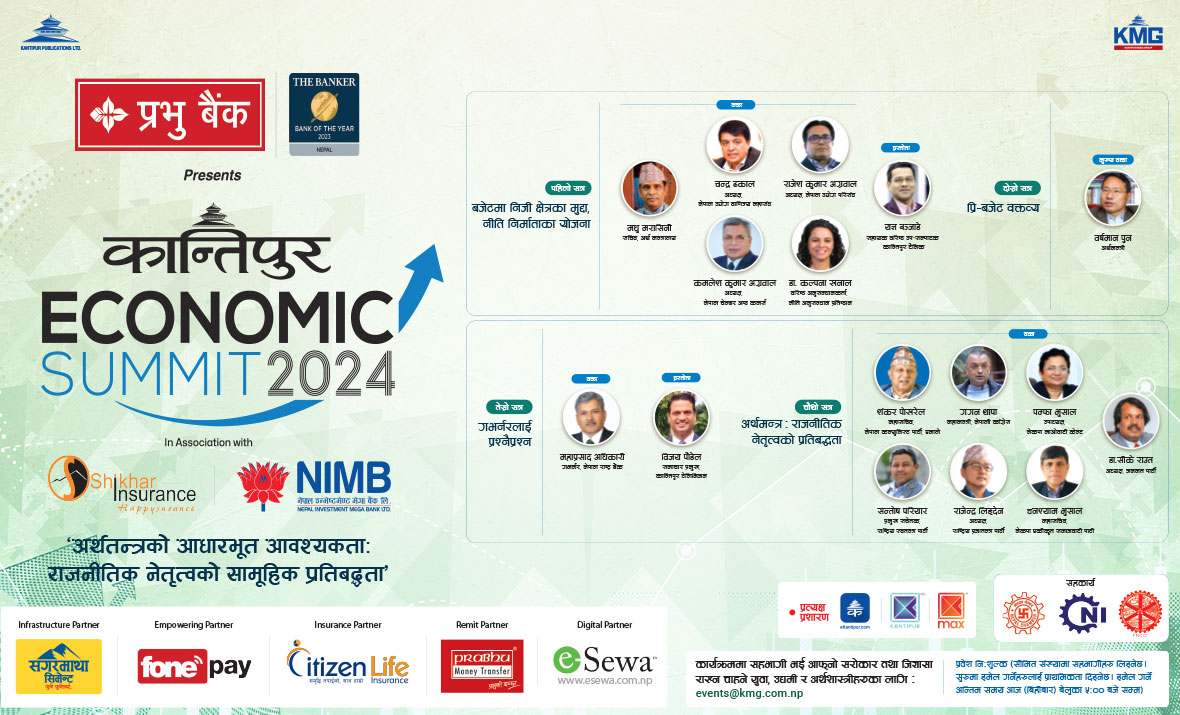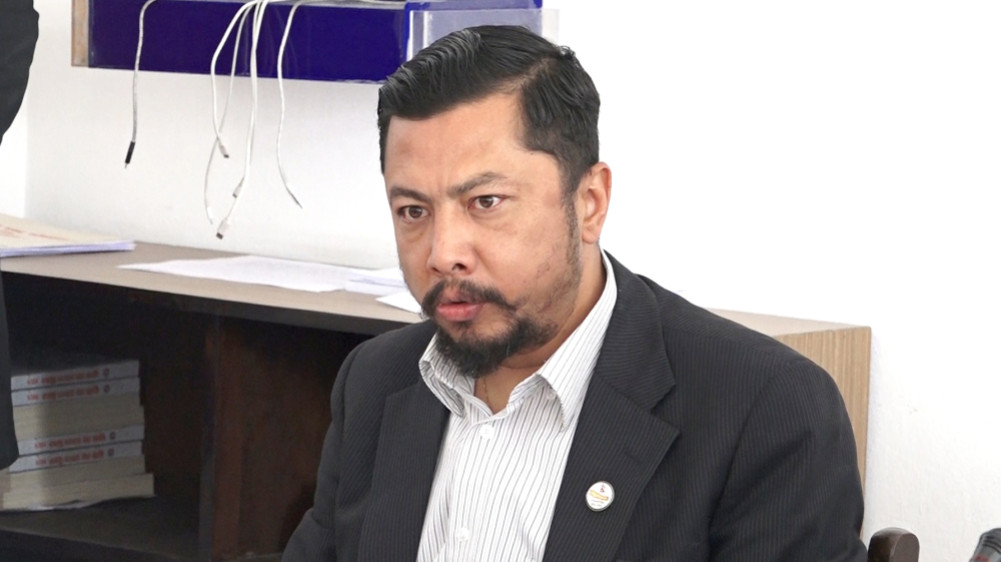Now structural reforms in the judiciary
We use Google Cloud Translation Services. Google requires we provide the following disclaimer relating to use of this service:
This service may contain translations powered by Google. Google disclaims all warranties related to the translations, expressed or implied, including any warranties of accuracy, reliability, and any implied warranties of merchantability, fitness for a particular purpose, and noninfringement.


The Constitution issued in 2072 through the 'Constituent Assembly' elected by the Nepalese people is in its eighth year of implementation. Two-time periodical elections have also been completed and the process of formation-dissolution of three levels of assemblies or parliamentarians, government formation-dissolution continues. As the constitution was implemented during the process of federalism and inclusiveness, the minimum basic issues such as the service facilities required by the Nepali people, the expectation to live with dignity or access to justice due to the absence of an independent judiciary could not be fulfilled as desired.



Lawyers or judges on behalf of the parties in the court should be able to execute justice according to the valid principles of the constitution, laws and justice without being subjected to political, social, economic or coercive influence and pressure from anyone. This is the practice of an independent judiciary. For this, judges and legal practitioners should be able to demonstrate their competence, competence and ability. The first condition of the judiciary is its judicial independence. The identity of judicial independence is to take the initiative and give justice to the dispute brought before it in accordance with valid principles of justice, constitution, laws without direct or indirect interference, undue influence or pressure from any state organ. Certainly not judicial sanity. Not even absolute freedom. Without judicial independence within the structure of the judiciary, there cannot be transparency in the appointment, transfer, promotion and dismissal of judges. Nor can the Judiciary be the protector of the fundamental rights of the people. Therefore, a high-level constitutional reform committee for the restructuring of the judiciary seems to be necessary to conduct a thorough study and reform the following structure:
Constitutional Council : Prime Minister, Chief Justice, Speaker, Deputy Speaker, Speaker of the Upper House to recommend the appointment of the Chief Justice, heads of constitutional bodies and officers according to the constitution , the appointment of the leader of the opposition party and the Chief Justice, there will be a Constitutional Council of 6 members up to the Minister of Law. When the council recommended, there was trust and confidence in the public mind that there would be appointment of a famous person from the respective field who had made an incomparable contribution to the national life, but there was a game of badness in it.
Sometimes a meeting is held without giving 48 hours notice to the leader of the opposition party, the court has to interfere with it, sometimes the parliament is tricked many times to appoint its own people and an ordinance has to be brought with malice to reach the quorum if 3 people are present and the justification of the writ against it ends, even the constitutional bench has declared the case. Failure to do so is a great mockery of democracy and an independent judiciary. Therefore, no matter how many responsible officials of the state were in the constitutional council, the constitutional ethics continued to be mocked. It seems inevitable to amend or amend the constitution by removing the Speaker, Deputy Speaker and Speaker of the National Assembly from the Constitutional Council, as they are responsible for the rule of law and the rule of law in any work.
Judicial Council : There is a constitutional provision for the Judicial Council to recommend or consult on the appointment, transfer, disciplinary action, dismissal and other matters related to the administration of justice. In the formation of the Judicial Council, there is a system of 5 members consisting of the Chief Justice, the most senior judge of the Supreme Court, a jurist on the recommendation of the Prime Minister, and a senior or advocate on the recommendation of the Nepal Bar Association. In order to create an independent judiciary, the Judicial Council must also remain independent. The current Judicial Council itself, which appoints judges, appears to have an executive majority. If there is no majority of the judiciary in the formation of an independent judiciary, there is a danger of political interference. The influence of the executive in the appointment of judges in the past. The Justice Council could not remain untouched by this.
If we look at the international practice, it seems that 17 countries have formed judicial councils for the purpose of appointing judges. Among them, in South Africa, there is a trend of forming the Judicial Service Commission with 25 representatives from different regions. which advertises the number of vacant seats. Shortlists. Interviews are held publicly and appointments are made. Therefore, the participation of jurists who have made incomparable contributions in the field of justice and law is necessary so that there is no political majority in the Justice Council and there is a majority in the field of justice. A 3-member Justice Council should be formed, including the Chief Justice, the Law Minister and a senior advocate who has reached the age of 65 and has no fear or fear in the Supreme Court judge, representing the Nepal Bar. It also seems appropriate in terms of legitimacy.
Parliamentary Hearing Committee : Although parliamentary hearings have been arranged for the separation of powers, balance of power and constitutional legitimacy, it is not being implemented effectively in accordance with the constitutional and legal procedures. Parliamentary accountability is mocked by the tradition of deliberately not forming a parliamentary hearing committee, even if a hearing is conducted, only names are heard and recommendations are made, or the hearing is not held for 45 days. Furthermore, in accordance with the constitution and laws, no appointment shall be made without a parliamentary hearing and the constitutional validity of such appointment shall be given legality.
Judge appointment : According to Article 129 of the Constitution, there is a provision regarding the appointment of Chief Justice and Supreme Court Judge and Article 140 of the Constitution regarding the appointment of the Chief Justice and High Court Judge, but in practice these qualifications have been neglected and desirable qualifications have come to play a major role. The constitution does not envisage it. The concept of the constitution is that a Nepali citizen who has attained the mentioned qualifications will become a judge of the Supreme Court and become the chief justice for a maximum of 6 years regardless of who the judge is within three years of becoming a judge.
Can the Judiciary remain independent from the executive by holding the reins of politics and becoming the Chief Justice while competing in the league race without qualifications? Of course it can't. It is obvious that the appointment is made on the basis of more political or more desirable qualifications such as one's own person rather than the qualifications and abilities mentioned in the said constitutional provision. This is interfering with the dignity of an independent judiciary. Moreover, the Justice Council should appoint judges to the Supreme and High Courts according to their constitutional and legal qualifications rather than political and desirable qualifications such as their own people.
Judicial Council Regulations : The recently implemented Judicial Council Regulations stipulate that the judges appointed by the chief registrar, registrar, secretary and joint secretary will be senior to the judges who were appointed by lawyers and district judges ten years ago and will have retroactive effect, Article 141 (3) of the Constitution. ) was also brought to contradict. As this regulation has a direct impact on justice when it is implemented, this regulation should be repealed immediately and another regulation should be issued.
Chief Justice : According to Article 136 of the Constitution, the Chief Justice has the ultimate responsibility to make the administration of justice effective. The Chief Justice has the ultimate responsibility to make the administration of justice effective in the Supreme and Subordinate Courts, Specialized Courts or other judicial bodies. According to this arrangement, the leader of the judiciary is the Chief Justice. According to the current constitutional system, if the Supreme Court has been a judge for three years, the Constitutional Council can recommend the Chief Justice as the minimum qualification. But the Chief Justice has not been appointed based on this qualification alone.
Independence, competence and impartiality of the courts are considered indispensable in a democratic governance system. It is indispensable for the state to protect the independence of the judiciary in the constitution, laws and respect its independence. Therefore, it is necessary for the Chief Justice to be accountable to the Constitution, laws and valid principles of justice and to exercise legal accountability.
Constitutional Court : There is a constitutional bench within the Supreme Court, where there are 5 people including the Chief Justice and the Chief Justice appointed by the Judicial Council. Even though there is a legal provision that the constitutional bench sits every Wednesday and Friday, it is never formed and after years the Supreme Court itself has to issue a mandate to form the bench. When there is no Chief Justice, there is no bench sitting, there is a tendency to dismiss election cases even after one election is over and the writ is dismissed. As the case of 52 officials of the constitutional bodies appointed through the
ordinance has not been heard until now, it seems that its effectiveness is decreasing even in the implementation of federalism and inclusiveness. Even though it seems positive in some cases including the restoration of the two Houses of Representatives, its justification is questioned. Therefore, it seems inevitable to form a separate and independent constitutional court to make the constitution alive by interpreting the federalism, inclusiveness and the constitution. From this, it seems that if the Constitution is amended so that the existing 21 judges in the Supreme Court remain the same and 5 judges remain in the Constitutional Court, it seems that justice can be delivered quickly.
impeachment : If the Chief Justice or the Supreme Court judge has seriously violated the constitution and laws, has lack of efficiency or bad conduct or has not honestly performed official duties or has seriously violated the code of conduct, one-fourth of the total number of members in the House of Representatives shall immediately submit a motion for impeachment. can Article 101 sub-section (2) of the Constitution has this provision. There is a provision that if such a proposal is passed by a two-thirds majority, he will be dismissed from office. Likewise, after the commencement of the impeachment proceedings according to sub-section (6), the Chief Justice or Supreme Court judge, member of the Judicial Council, head of the constitutional body or official shall not be allowed to perform the duties of his office until such proceedings are concluded. Based on this constitutional arrangement, the impeachment proceedings were suspended after they started. In the case of Sushila Karki, she was released due to an interim order issued by the Supreme Court, while Cholendrashamsher Rana retired under suspension.
In India, six judges, including the Chief Justice, have been impeached, but to this day, they have not been impeached. According to Article 124(4) of the Constitution of India, if the Chief Justice or a judge of the Supreme Court is impeached by a two-thirds majority of both the Federal Houses on the grounds of bad conduct and incompetence, the judges of the Supreme Court shall not be dismissed from office except by the President.
Impeachment is regarded as a constitutional remedy against serious crimes in the United States. It is also a weapon to disqualify a public official. It is used to make the government constitutionally accountable, freeing it from public accountability rather than punishment. In the 235 years since the US Constitution was issued, impeachment has been practiced 60 times. Congress has full power to impeach.
The Senate has full authority to approve or disapprove all impeachment proposals brought by Congress. Parliamentarians have the constitutional right to bring impeachment motions to the President, Vice President and all judges and government officials. If the crime is proven, they will be dismissed from the office and disqualified from holding any other government service. According to Article 3 of the US Constitution, judges of the Supreme Court or lower courts may remain in office as long as they are of good behavior. But although Congress has full power to impeach, a two-thirds majority of the Senate is considered mandatory to pass as a crime of impeachment. If any crime is proven, such judges will be dismissed.
Even in Nepal, the system of suspending the impeachment proceedings should be ended. The impeachment recommendation committee must submit it to the House of Representatives within one month from the date of registration of the impeachment proposal. Otherwise, the legal accountability of it should be taken by the House of Representatives.
Conclusion
Judicial structural formation or work, duties and rights are mentioned in the constitution, but they could not be effective due to procedural errors or access to justice has been questioned. It is ironic that even though there is an arrangement for parliamentary hearing, there is no hearing but appointment, and the appointment of the officers of the constitutional body and the Chief Justice, while the quorum of the Constitutional Council is more than two-thirds in the constitution and law, bypassing the parliament by forcefully keeping a quorum through an ordinance. Unexcingly developed politics and capacity of constitutional evangelism, which was often affected by the constitution and capacity of the constitution, and the legal development of the legislature. Final responsibility to make the judiciary of the court and other judicial administration effective is the Protectionalms. But the constitutional responsibility could not be distracted by all the chiefs. Antichrist found a blazing as an amazing of the Chief Justice to end the convention. To end these and similar trends, modifying the constitution and the people's need for a diligent constitution is also required for structures.
- Gyawali Senior is a prespective. & nbsp;
प्रकाशित : चैत्र १६, २०८० ०८:४७


 २६.१२°C काठमाडौं
२६.१२°C काठमाडौं















